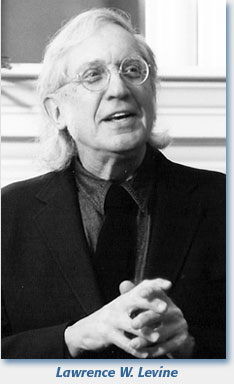 On October 23, 2006, Lawrence W. Levine, American historian at the University of California at Berkeley and George Mason University, Macarthur Fellow, past president of the Organization of American historians, and recipient of the American Historical Association's Award for Scholarly Distinction, died of cancer in Berkeley.
On October 23, 2006, Lawrence W. Levine, American historian at the University of California at Berkeley and George Mason University, Macarthur Fellow, past president of the Organization of American historians, and recipient of the American Historical Association's Award for Scholarly Distinction, died of cancer in Berkeley.
Levine was born in New York City, to Russian and Lithuanian Jewish immigrant parents, in 1933. His father ran a grocery store where he gave a discount to schoolteachers. A self-described "screw up" in high school, Levine attended the City College of New York as an undergraduate and earned his PhD from Columbia University, as a student of Richard Hofstadter. His dissertation, later published as Defender of the Faith, examined the last decade of William Jennings Bryan's life. Levine began teaching at Berkeley in 1962. At Berkeley he earned a reputation as one of the leading figures in American history and a pioneer in the field of cultural history. His notable publications include Black Culture and Black Consciousness, a study of African American folk thought from slavery through freedom; Highbrow/Lowbrow, a study of the emergence of cultural hierarchy in 19th-century America; a series of explorations into diverse patterns of American cultural history entitled The Unpredictable Past; a history and defense of the evolution of the curriculum in American higher education, The Opening of the American Mind; and most recently, with Cornelia R. Levine, a study of Franklin Roosevelt's Fireside Chats and a collection of the responses to them, published as The People and the President.
Levine retired from Berkeley in 1994 as Margaret Byrne Professor of History. In that same year he began teaching as professor of history and cultural studies at George Mason University (GMU) in Fairfax, Virginia. Levine and his wife Cornelia kept an apartment on Capitol Hill in Washington, D.C., and lived there during the fall semesters while teaching at GMU. The Levines spent the rest of their year reading and writing in Berkeley. At his death he was at work on a cultural history of the United States during the Great Depression.
Lawrence Levine was a man of extraordinary humor, with a boundless memory for jokes and a keen sense of the intelligence and irony that humor contains. Anyone who spent time with Levine was struck by his powerful, loving fondness for the creativity, intelligence, and insight of human beings under pressure. This open-hearted warmth was one of the most distinctive aspects of his work and his person.
His work always stressed the human connection between historians and their sources, and insisted that good historical work forged a genuine, stable, empathic, or sympathetic bond with the past, a bridge of understanding. Levine put that bridge of understanding at the core of his work and he looked for it in the work of others. It meant freedom from snobbery, from cliché; it meant openness to what the sources were trying to say; it meant understanding how culture bound the imaginations of people in the past but also how a stubborn originality could escape those bonds. Lawrence Levine had argued for this empathic bond particularly in Defender of the Faith and in Black Culture and Black Consciousness. In both cases, an urban, working-class New Yorker of distinctively Jewish mien had managed to build a bridge to people who could have easily remained strange to him, people with whom he had little in common. In Levine's seminars at Berkeley and at GMU he consistently argued that history should allow us to see past our own subject positions and experience a meaningful connection with alterity.
Levine spoke of Hofstadter often, and with great fondness, as an intellectual mentor and a source of inspiration. His students and colleagues often found this somewhat puzzling—Levine's first book in effect repudiated Hofstadter's famous account of William Jennings Bryan as a backwards anti-modernist and treated him instead as a thoughtful, intellectually and morally consistent reformer. His most famous and influential book, Black Culture and Black Consciousness, celebrated the kind of minority culture Hofstadter tended to dismiss as off the point. But Levine shared Hofstadter's sense that the symbolic mattered, that the "irrational" or the marginalized contained a great deal of meaning. Moreover, he shared Hofstadter's celebratory sense of the 1930s as a more generous era, a period in American history when the notion of "America" and "American" broadened to include racial and ethnic minorities and to celebrate the lives not of the rich and the powerful, but the ordinary. Levine was keenly aware that he and people like him had been outsiders, and that the social and cultural changes initiated in the 1930s, in World War II, and most especially in the civil rights movement had opened doors. He never lost the sense of inclusion, optimism, and possibility that change conferred. For Levine, the 1960s continued gains made in the 1930s.
Levine had an eagle eye for elitism, for snobbery, for the commonplace disguised as insight, and he had zero time for it. In his work, a broadly democratic sensibility and a love for the underdog combined with a deep commitment to professional standards, to rigor, and to excellence. He was a generous-souled man, but he cared about getting history right; he cared about giving people in the past their due. He expected a lot from present, and because he expected a lot, and knew ordinary people were capable of intellectual depth and beauty, he could see things others missed. He could be fierce and formidable, but his many friends, colleagues, and students remember a loving man of humor and human grace.
—Michael O'Malley, George Mason University
Tags: In Memoriam North America
Comment
Please read our commenting and letters policy before submitting.






